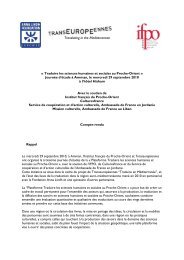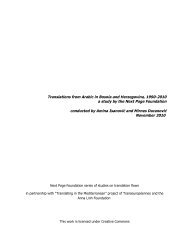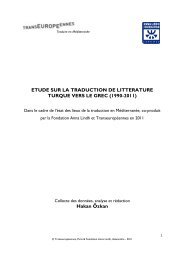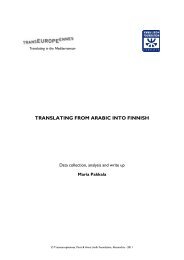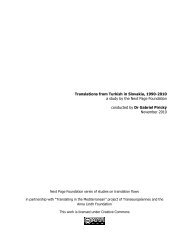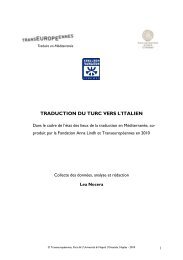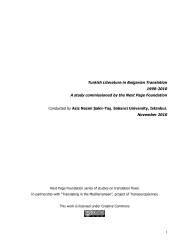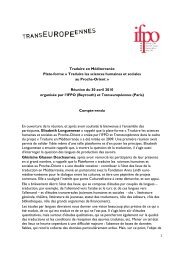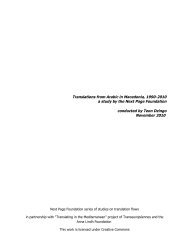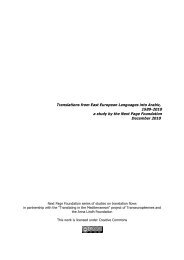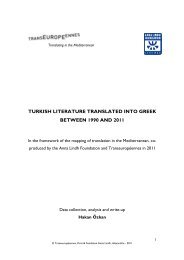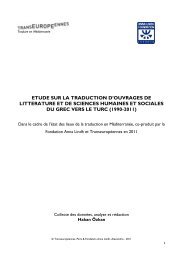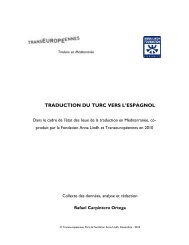Translations from Turkish in Serbia, 1990-2010 a study by the Next ...
Translations from Turkish in Serbia, 1990-2010 a study by the Next ...
Translations from Turkish in Serbia, 1990-2010 a study by the Next ...
You also want an ePaper? Increase the reach of your titles
YUMPU automatically turns print PDFs into web optimized ePapers that Google loves.
IntroductionThe past twenty years gave rise to all-embrac<strong>in</strong>g changes <strong>in</strong> <strong>the</strong> structure of <strong>Serbia</strong>n societyand state. Such changes also exert <strong>in</strong>fluence, to great extent, on cultural space and bookmarket <strong>in</strong> <strong>Serbia</strong> where <strong>the</strong> publish<strong>in</strong>g <strong>in</strong>dustry with great effort seek methods for survivalunder <strong>the</strong> unfavorable economic and political circumstances. The <strong>in</strong>tegral Yugoslav marketceased to exist, and <strong>the</strong> once jo<strong>in</strong>t cultural policy fell apart at <strong>the</strong> seams of <strong>the</strong> Republicboarders.In order to achieve <strong>the</strong> whole and clear picture of <strong>the</strong> situation <strong>in</strong> <strong>the</strong> market of translatedworks of <strong>Turkish</strong> literature <strong>in</strong> <strong>the</strong> past twenty years, it is necessary to look back at earlier times.<strong>Turkish</strong> literature has always been reputed as ra<strong>the</strong>r unknown and underrepresented <strong>in</strong> <strong>the</strong>entire translation production.First translations <strong>from</strong> <strong>Turkish</strong> Literature <strong>in</strong> <strong>the</strong> territory of former Yugoslavia <strong>from</strong><strong>the</strong> late 19 th century until 1965Parts of former Yugoslavia and present <strong>Serbia</strong> (Bosnia and Herzegov<strong>in</strong>a, Macedonia, Kosovoand Metohija, Sandzak) dispose of a rich oriental cultural legacy. Plenty of <strong>in</strong>habitants of <strong>the</strong>seregions converted to Islam <strong>in</strong> <strong>the</strong> course of history. <strong>Turkish</strong> is <strong>the</strong> language that, historicallyspeak<strong>in</strong>g, was <strong>in</strong> <strong>the</strong> longest contact with <strong>the</strong> <strong>Serbia</strong>n language and numerous Serbs of Muslimreligion (Bosniacs) could speak it. A great number of local Muslims dist<strong>in</strong>guished <strong>the</strong>mselves <strong>in</strong><strong>the</strong> literary opus of <strong>the</strong> Ottoman Empire which used to <strong>in</strong>clude <strong>the</strong> territories of formerYugoslavia.This is <strong>the</strong> reason why <strong>Turkish</strong> literature occupied a specific place <strong>in</strong> <strong>the</strong> Yugoslav environment,s<strong>in</strong>ce plenty of Yugoslav people experienced it as close at spiritual level. It was particularly <strong>the</strong>case, and still is, <strong>in</strong> Bosnia and Herzegov<strong>in</strong>a where <strong>the</strong> greatest number of translations ofliterary works written <strong>in</strong> <strong>Turkish</strong> emerged <strong>in</strong> <strong>the</strong> second half of <strong>the</strong> 19 th century. Firsttranslations <strong>from</strong> <strong>Turkish</strong> literature, however, appeared <strong>in</strong> <strong>the</strong> territory of Vojvod<strong>in</strong>a that <strong>in</strong> <strong>the</strong>19 th century was affected <strong>by</strong> romantic ideas and expand<strong>in</strong>g <strong>in</strong>terest <strong>in</strong> oriental literatures andcultures. Such translations were predom<strong>in</strong>antly made <strong>from</strong> German language.The first translators of <strong>Turkish</strong> literature <strong>in</strong> Bosnia and Herzegov<strong>in</strong>a were journalists, publicofficers and men of letters who most often acquired education at religious schools. Hence <strong>the</strong>irtranslations were usually made <strong>from</strong> <strong>the</strong> orig<strong>in</strong>al language. Their selection of works reflectedra<strong>the</strong>r <strong>the</strong> level of <strong>the</strong>ir personal knowledge and <strong>the</strong>ir literary taste <strong>in</strong>stead of provid<strong>in</strong>g a real<strong>in</strong>sight <strong>in</strong>to what was go<strong>in</strong>g on <strong>in</strong> <strong>Turkish</strong> literature. Therefore, it often happened that<strong>in</strong>significant and weak authors were presented as prom<strong>in</strong>ent <strong>Turkish</strong> men of letters, and <strong>the</strong>irworks as supreme literary achievements.2



